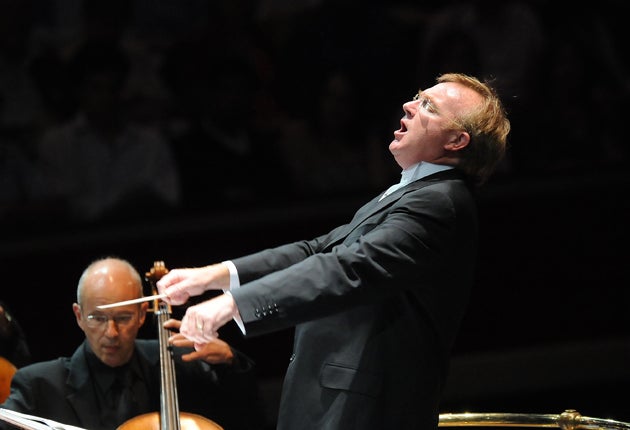BBC Proms: BBC SSO / Brabbins/Berezovsky, Royal Albert Hall, London
Great Scots and rousing Russians

One by one the nations come forward, but Russia is never far away.
Prom 44 saw the Russian National Orchestra – with Andrey Boreyko standing in for its founder-conductor Mikhail Pletnev – celebrating its first 20 years. They delivered Tchaikovsky's Suite No 3, and a coruscating performance of Rachmaninov's Rhapsody on a Theme of Paganini with Nikolai Lugansky at the piano. Prom 45 saw the BBC Scottish Symphony Orchestra under Martyn Brabbins celebrate its first 75 years, with Tchaikovsky's Second Symphony, Rimsky-Korsakov's Sheherazade, and Liszt's First Piano Concerto with the young Russian-Israeli pianist Boris Giltburg who is another Pletnev protégé.
There was also a new work by a Scottish composer – James Dillon's La Navette. This French word indicates a shuttle, as used in weaving, and the programme note suggests that the piece should be heard as the evocation of a blood-stained saga from Ovid dealing with rape, mutilation, and the symbolic weaving of an excised tongue into a tell-tale piece of cloth. For the programme essayist, its title conjures up "a world of dark and violent mythology, and speaks of hope, ingenuity and resilience".
But this is one of those moments when listeners (and critics) divide, because for me La Navette was purely and simply about its abstract self. Following in the tradition launched by Ligeti half a century ago, Dillon turned his orchestra into a vast machine whose moving parts shimmered and shivered metallically. It was too massive to suggest gamelan, and its pulsating rhythms had a driven quality: after 10 minutes it seemed played-out, and then came 10 minutes more, but still the applause was warm.
Not as warm, however, as it was for Sheherazade – led by violinist Janice Graham with commanding virtuosity – or for Giltburg's stunning performance in the Liszt. Richter and Rubinstein are this pianist's keyboard gods, and his playing has already been plausibly compared with theirs; here his weightless, crystalline sound brought out the purity of Liszt's lyricism and the luxuriance of his effects. There was no question of the audience letting this bright, brilliant creature go without giving an encore, and when it came – Liszt at his most ethereal – it was breathtaking.
Subscribe to Independent Premium to bookmark this article
Want to bookmark your favourite articles and stories to read or reference later? Start your Independent Premium subscription today.

Join our commenting forum
Join thought-provoking conversations, follow other Independent readers and see their replies